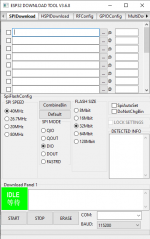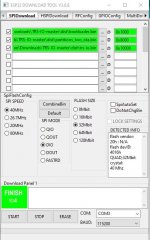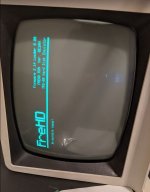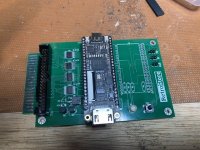ngtwolf
Veteran Member
Just thought i'd start a thread on the TRS-IO for anyone else using/building one, it might be a good place since I noticed the documentation was not quite complete. I got a few of the boards made from pcbway and a friend and I are making a couple for our systems. Just wondering if anyone else out there has built them and has any tips. The few things i've noticed so far is that the BOM is missing some components, specifically the resistors. My friend was able to track down what we believe are correct, from the schematics. Also noticed the board is slightly different then the one on the github page.
https://github.com/apuder/TRS-IO
This is where I am so far. I'm waiting on an ESP32 to arrive (I thought I had one but it appears it was a 8266 I had instead) as well as the 74LVC245AN which I also thought I had but misread the part (I have LS's).
Missing from the BoM appears to be the following:
R1-R3 - 470ohm ?
R4 - 4.7k ohm ?
Hopefully that's correct for those, if not, let me know. I don't think R4 is needed unless theres a FreHD (which I don't have), but i added it anyway.
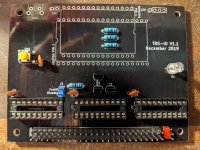
Other than the ESP32 and chips I still haven't populated, do any of the other areas on this board still need to populated? No mention of SW2 that I could find. I also assume this supports both the 30 pin and 38 pin ESP32, which is why there are two different connections on the board?
I already flashed a GAL chip, so will just need to do the ESP32 when it arrives (haven't checked the documentation on that to see if it's all there yet or not). I noticed the GAL image is 9 months old, and predates the v1.1 board.
https://github.com/apuder/TRS-IO
This is where I am so far. I'm waiting on an ESP32 to arrive (I thought I had one but it appears it was a 8266 I had instead) as well as the 74LVC245AN which I also thought I had but misread the part (I have LS's).
Missing from the BoM appears to be the following:
R1-R3 - 470ohm ?
R4 - 4.7k ohm ?
Hopefully that's correct for those, if not, let me know. I don't think R4 is needed unless theres a FreHD (which I don't have), but i added it anyway.

Other than the ESP32 and chips I still haven't populated, do any of the other areas on this board still need to populated? No mention of SW2 that I could find. I also assume this supports both the 30 pin and 38 pin ESP32, which is why there are two different connections on the board?
I already flashed a GAL chip, so will just need to do the ESP32 when it arrives (haven't checked the documentation on that to see if it's all there yet or not). I noticed the GAL image is 9 months old, and predates the v1.1 board.

